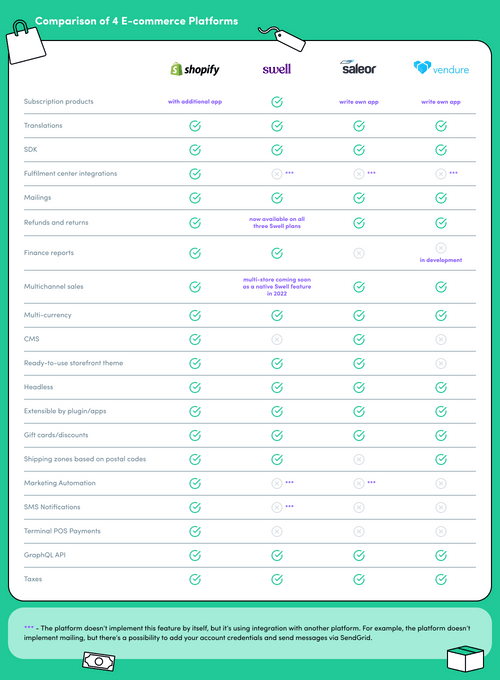For a good few years, there’s a growing need for digital transformation. All the brands, small or large, have to be online to keep up with new trends and customers’ needs. Thanks to e-commerce platforms, we don’t have to leave our houses to buy, exchange and sell items. Doing it online is convenient and far more efficient. That’s why many entrepreneurs decide to adopt this trend or even make it a business foundation.
Luckily, there’s plenty of e-commerce platforms that you can choose from. To help you with the decision, we’ve done a little research. We were looking for the ones written in the tech stack similar to ours and found a few that we could use to develop our clients’ apps. (So basically, yes, it’s all for you.)
How to pick the right one? What should you pay attention to when weighing the pros and cons of a given platform? Let’s see how the comparison of Swell, Saleor, Vendure and Shopify turned out.
The beginnings of e-commerce platforms
The whole idea of making the e-commerce platforms comparison came from our clients. Some of them already had experience in online selling, and they wanted to have their place to do that, while others decided to start with e-commerce platforms. All of them had requirements and needs as to how it should look like, what to include, and time was of the essence.
After carefully analyzing the proposals, we decided that building an e-commerce platform from scratch would take too much time. Especially because it’s not just about putting the items to the basket and making the order, but also about connecting them to fulfilment centres, order tracking, shipments on different continents, and many more. In short, it’d take a whole lot more time than the clients would like.


Have a project in mind?
Let’s meet - book a free consultation and we’ll get back to you within 24 hrs.
The factors
Before we move on to the comparison, let’s go back and try to narrow down the requirements. When considering different platforms for an e-commerce business, what are the factors to look for? Writing a list of such condition facilities the process and turns your focus to the critical question – which e-commerce platform will fulfil my business needs?
Scalability
Your business may grow – more products, new payment methods, and many other elements will appear on the platform. Hence the online store should also be able to grow without difficulties.
Even if you start from scratch, it may soon turn out that you need more than just a basic plan. So, you should consider an e-commerce platform that will facilitate the process and provide you with all the necessary features.
Software Integration
As I said before, it’s no longer about just selling and buying. Now, it involves more features and, more importantly, more third-party service providers. That’s why, when looking at a potential e-commerce platform, find out what it integrates with.
User Experience
Target audience is your answer to everything. For this reason, when selecting the e-commerce platform, you should also include its users in your choosing process.
Convenience shopping equals an intuitive and well-built site. So what that you have great products if the platform is not user-friendly? In this factor, you should also consider site optimization. It should be responsive, fast and work on every device.
Cost
Look at their pricing and see which one is most beneficial for you. What do you need, and which features are less important. Thanks to this, you won’t be spending money on functionalities that you don’t need.
The comparison
Vendure
Vendure is a framework that helps us create a platform and customize many things. There’s a lot of foundation and much space for you to tailor it to your needs.
This e-commerce platform provides support for many payment workflows. In the framework API, you can find interfaces that you can implement to add payment support in your application. Besides this, there are many other integration examples that you may find in the documentation or implementation examples.
Another useful solution of this e-commerce platform may be the use of official payments plugins created by Vendure team. It also offers good documentation and creating custom features seems to be “developer friendly”.
All in all, Vendure is a great e-commerce platform, but it may pose some problems for someone who’s already selling items on several platforms and now wants their store. It’d take a long way to integrate it.
Swell
Swell is another tool thanks to which you can quickly create an online store. All you have to do is register, and get started building your online store immediately. That’s it.
Plus, Swell is constantly evolving and growing – with new functions, there are new possibilities.
Another advantage of Swell are the many integrations which you may use. For example, the integration with ShipStation for managing and tracking order fulfillment, or SendGrid for e-mail messaging and marketing campaigns.
As I said before, you can quickly set up a store, there are reports on its operation thanks to which you can monitor the losses and gains. Moreover, it has ready-made libraries, extensions, plugins and custom elements that programmers can use to refine the digital product.
Also, it integrates with the most common payment systems, such as PayPal or Amazon, so that’s another advantage. However, looking at all the drawbacks, I’d say that Swell is best for small and medium stores.
Saleor
It’s an open-source e-commerce platform that focuses on flexibility – it gives the option to use your existing storefront, build a brand new one or apply a storefront prepared by Saleor that supports PWA.
Apart from that, it provides you with an admin dashboard and a whole range for adding or extending features via app or plugins. As your store grows, it gives you and your customers more options to choose from.
Moreover, there are many possibilities when configuring the products, but there’s no possibility of generating reports and medium-level inventory management. That can interfere with the whole system functioning, as either you’d have to do it yourself or the development team would have to create it.
Shopify
I saved the best one for last – our choice. When creating an account on Shopify, you immediately have an admin dashboard that’s intuitive and provides you with the basics – adding/removing products from the basket, buying the items, product groups along with attributes for them and user accounts.
But all the Shopify’s power is based on its market place, in which there are many options to choose from (free of charge or paid).
Moreover, this e-commerce platform has the most built-in integrations with external providers – social media channels, payment systems (but also has its own), fulfilment centres (same story). Plus, it has many variants of plans. For example, in the higher pricing plans, Shopify supports all currencies and their conversions, which is somewhat unusual in e-commerce platforms.
From all platforms described in this article Shopify is most dynamically developed. One example of this is that their change log is often updated. All of it translates to Shopify’s stable position on the market and its popularity among users.
However, there are also some drawbacks. First of all, there’s an API rate limit (not that bad, but still, there’s one). Also, the data is not exclusive. It’s all in the cloud, which may pose a problem for some entrepreneurs.
Bottom line
The result of our research was clear – Shopify is the most complete e-commerce platform out of these 4. It facilitates moving your business online and provides you with all the help to get you started. You can hire a Shopify expert, read API documentation about what you can access and learn the requirements along with the rules concerning governing security.
Choosing the right e-commerce platform for your business is a long journey. I hope we’ve made that a bit easier for you. If you have any questions concerning the subject or want to consult your idea, don’t hesitate. Send us a message, and we’ll help you make the right choice.
Editor’s note: We’ve originally published this post in April 2021 and updated it for comprehensiveness.


Have a project in mind?
Let’s meet - book a free consultation and we’ll get back to you within 24 hrs.
Dive into Jakub’s articles on e-commerce and building Shopify apps.
Other worthy reads




